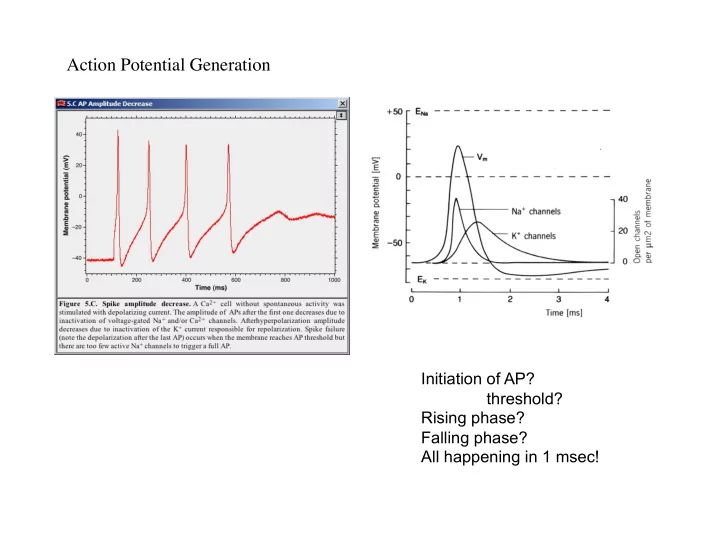

Action Potential Generation � Initiation of AP? threshold? Rising phase? Falling phase? All happening in 1 msec!
Current across membrane I m = I Rm + I Cm Examples of passive voltages Initiating AP?? AP spread ahead Receptor potentials Synaptic potentials
Experimental measurement of space constant Typical values 0.01 to 1.0 mm.
Evolution of fast signal conduction Increase membrane resistance to leak current flow Reduce internal resistance to current flow
Lambda and tau interact to determine speed and amplitude of voltage change ahead of AP Tau 1-20 ms
Initiation Na vs K Na wins Threshold- dynamic Again Na vs K Fall- K
Traveling AP- unmyelinated nerve Local current flowing ahead of AP initiates next AP What happens first?- Spreading charge depolarizes C m . 1 ms!
Comparison of traveling AP Traveling AP- myelinated nerve Also: Cs in series add reciprocally
Traveling AP- myelinated nerve Repolarization at Nodes of Ranvier by fast tau for repolarization unmyelinated nerve resting g= 0.2-1 mS/cm 2 , tau 1-20 ms myelinated nodes resting g= 40 mS/cm, tau= 100 � S!
AP conduction velocity: Squid giant axon vs. myelinated nerve 19 m/s = 43 mph 500 micron Same as 10 micron Frog myelinated fiber!! Alpha motor neuron: 120 m/s = 268 mph 8.6 microns Nerves Squid Mammal Unmelyinated C pain fibers: 2m/s = 4 mph 1.5 micron
Refractory periods
Why doesn’t the AP go backwards?
I/V curve explanation for AP V r stable V th unstable V peak could be stable but conductances are time and V sensitive
Refractory periods D- g K >>>g Na C- g Na recovering, but no AP B- smaller AP A- full AP A B C,D Notice threshold change
Calcium APs Add Ca to the equation
Examples of calcium APs
Na vs. Ca AP
Calcium current contributing to APs
Calcium current inactivation
Ca-activated K current
Na AP vs. Heart AP
Cardiac AP currents
Recommend
More recommend